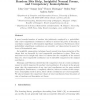Free Online Productivity Tools
i2Speak
i2Symbol
i2OCR
iTex2Img
iWeb2Print
iWeb2Shot
i2Type
iPdf2Split
iPdf2Merge
i2Bopomofo
i2Arabic
i2Style
i2Image
i2PDF
iLatex2Rtf
Sci2ools
88
Voted
COLT
2003
Springer
2003
Springer
On Learning to Coordinate: Random Bits Help, Insightful Normal Forms, and Competency Isomorphisms
A mere bounded number of random bits judiciously employed by a probabilistically correct algorithmic coordinator is shown to increase the power of learning to coordinate compared to deterministic algorithmic coordinators. Furthermore, these probabilistic algorithmic coordinators are provably not characterized in power by teams of deterministic ones. An insightful, enumeration technique based, normal form characterization of the classes that are learnable by total computable coordinators is given. These normal forms are for insight only since it is shown that the complexity of the normal form of a total computable coordinator can be infeasible compared to the original coordinator. Montagna and Osherson showed that the competence class of a total coordinator cannot be strictly improved by another total coordinator. It is shown in the present paper that the competencies of any two total coordinators are the same modulo isomorphism. Furthermore, a completely effective, index set version ...
| Added | 06 Jul 2010 |
| Updated | 06 Jul 2010 |
| Type | Conference |
| Year | 2003 |
| Where | COLT |
| Authors | John Case, Sanjay Jain, Franco Montagna, Giulia Simi, Andrea Sorbi |
Comments (0)

